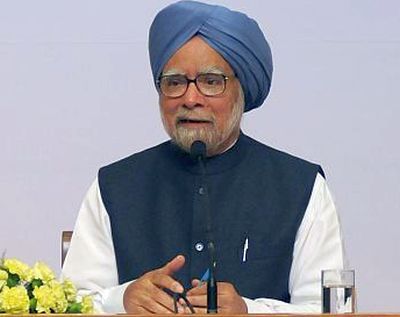Several Congress leaders interpreted it as a dig at Prime Minister Modi who is yet to address a single press conference in his 54-month tenure.
Archis Mohan reports.

Dr Manmohan Singh had long been criticised by many, including current Prime Minister Narendra Damodardas Modi, as a maun or silent prime minister.
On Tuesday, December 18, Dr Singh hit back at his critics -- including his successor -- stating that he was never afraid of talking to the press during his 10-year tenure, and not only met journalists regularly but also addressed on-board press conferences after his return from overseas visits.
The 86-year-old leader made the comment at the launch of a five-volume set titled Changing India, which is the compilation of his work as an economist, in the bureaucracy, and as a politician.
Several Congress leaders present interpreted it as a dig at Modi who is yet to address a single press conference in his 54-month tenure.
As Ashoka University Chancellor Rudrangshu Mukherjee -- one of the editors of the volumes -- said in his introduction, the fifth volume of the set has two parts that are the most voluminous of all.
Ironically, these compile Dr Singh's speeches as prime minister, while "ignorant" critics would chide him for being a silent PM.
Later, Dr Singh said, "I think these volumes speak for themselves and I don't want to boast about achievements as the prime minister, but the events that took place are well described, particularly in the volume that deals with 'Prime Minister Speaks'."
Dr Singh recalled that in July 2005, during his first visit to the US, officials had advised him not to address a press conference organised by the National Press Club in Washington, DC. He said the officials were nervous, but it turned out to be successful and the verbatim record is published in these volumes.
"I certainly would like to say that I was not the prime minister who was afraid of talking to the press. I met the press regularly and on every foreign trip that I undertook, I had a press conference in the plane or immediately after landing. There are press conferences whose results are also described," he said.
Apart from addressing two 'national press conferences' at Vigyan Bhavan, Dr Singh would answer the media's questions at the start of Parliament sessions and always addressed the on-board media upon his return from officials visits abroad.
Speaking to the media after the event, Dr Singh said he has not studied the impact of farm loan waivers that the Congress party has promised in Chhattisgarh, Madhya Pradesh and Rajasthan, but a commitment made to the people should be honoured.
On the recent tension between the government and the Reserve Bank of India, Dr Singh said the relationship between the two is like that of 'husband-wife' and the difference in opinion must be resolved in a harmonious manner.
"There will be hiccups, there will be difference in opinion, but ultimately these must be harmonised in a manner that the two great institutions can work in harmony," Dr Singh, who served as RBI governor from September 1982 to January 1985, said.
"Whosoever is the governor of the RBI, I wish him well," Dr Singh said on Dr Urjit Ravindra Patel quitting as RBI governor and retired IAS officer Shaktikanta Das taking over as the new governor.
The former PM said the country needed a strong and independent RBI, which has to work in close cooperation with the central government. "I do hope and pray that the government and the RBI find a way to work together," he said.
The unveiling of the books -- Dr Singh credited his three daughters for putting the volumes together and Congress leader Jairam Ramesh for fishing out a couple of reports he had penned as the economic advisor to the Indira Gandhi government in the 1970s -- was followed by a conversation between him and former World Bank chief economist Dr Kaushik C Basu.
The former PM said the volumes represented the entire lifetime of his professional life, nearly 62 years, and history will judge whether what he did was right or wrong.
Dr Singh shared with the gathering his early years of struggle in a village in Punjab, now in Pakistan, and how he had to give his matriculation examination twice because of Partition.
Dr Singh, who is currently a Rajya Sabha member, also reminisced about his equation with political leaders, including Indira Gandhi, Morarji Desai and P V Narasimha Rao.
Dr Singh said many people have commented how he was an 'accidental prime minister', but what is not known is how he was also 'an accidental finance minister' when he was given the portfolio by Rao in 1991.
Former RBI governor I G Patel was Rao's and P C Alexander's choice to be finance minister, he said, but Dr Patel turned it down and recommended Dr Singh's name.
However, Dr Singh did not take Alexander's offer seriously, and only accepted the offer when Rao, the then prime minister, tracked him down at the University Grants Commission that he was heading then.
Dr Singh said when the Janata Party government came to power, then prime minister Desai wanted to remove him given Dr Singh's proximity to the Indira Gandhi dispensation, but then finance minister H M Patel insisted that Dr Singh should continue.











